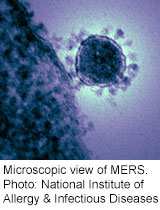- Planters Peanut Products Under Recall Due to Listeria Risk
- That ‘New Car Smell’ Could Be Toxic Carcinogens
- Gene Discovery Points to a New Form of Alzheimer’s
- Scientists May Have Located Your Brain’s ‘Neural Compass’
- Almost All Counterfeit Oxycontin Pills Contain Fentanyl
- A Parent’s Watchful Eye Does Keep Kids From Drugs, Alcohol: Study
- AI Might Boost Detection of A-Fib
- Drug May Help Folks Kick the Vaping Habit
- Small Pump May Let Kids Stay Home As They Await New Heart
- Gene Therapy Improves Vision in People With Inherited Blindness
Florida MERS Patient Released From Hospital


One of three patients in the United States diagnosed with the MERS virus has been released from an Orlando, Fla., hospital, officials said Monday.
The man, a 44-year-old health care worker from Saudi Arabia — the epicenter of the MERS outbreak — traveled to Orlando where he started feeling symptoms of the respiratory illness formally called Middle East Respiratory Syndrome on May 8. The unidentified man was put into isolation at Dr. Phillips Hospital, but hasn’t had a fever since May 13, Orlando TV station WESH reported Monday.
The third U.S. case of MERS — an unidentified man from Illinois — has tested positive for the MERS virus but shows no signs of the illness, federal health officials reported Saturday.
The Illinois man is a business associate of the man who brought the first known case of MERS to the United States in late April. That first case was a health care worker who had traveled to Saudi Arabia and returned to the United States before falling ill and being hospitalized in Indiana. The Indiana patient was released from the hospital on May 9.
The Illinois man probably got the virus from the Indiana patient and developed antibodies to fight the virus, officials from the U.S. Centers for Disease Control and Prevention said. The men had two business meetings together before the Indiana man fell ill, officials added.
The health risk from MERS to the general public is very low, U.S. officials have said, because the virus is only passed through close contact.
MERS symptoms typically include shortness of breath, coughing and fever.
MERS kills about one-quarter of the people who contract the virus, according to CDC officials.
One-fifth of all MERS cases have occurred among health care workers, CDC officials have said.
In some countries, the MERS virus has spread from person to person through close contact, such as caring for or living with an infected person. But, there’s currently no evidence of sustained spread of MERS in general settings, the CDC has said.
The MERS virus first surfaced in 2012 in the Middle East, where most of the cases have occurred. Since that time, there have been 536 laboratory-confirmed cases and 145 deaths, according to the World Health Organization.
Camels have been identified as carriers of MERS, but it’s not known how the virus is being spread to people.
More information
For more on MERS, visit the World Health Organization.
Source: HealthDay
Copyright © 2024 HealthDay. All rights reserved.










